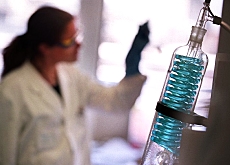Swiss struggle to keep up with research demand

Companies in Switzerland rely on foreign graduates to fill research and development projects as Swiss universities struggle to match increased demand.
A survey shows that one in four research and development (R&D) graduate posts in Switzerland is filled by a foreigner while a third of all jobs in the sector go to non-Swiss.
The results of the joint report by the Federal Statistics Office and Swiss Business Federation, economiesuisse, were released in Zurich on Tuesday.
Andrea Steiner, president of the economiesuisse Commission for Science and Development, believes that Swiss students are forced to study too long for their degrees, putting them at a disadvantage.
“Six years studying for a PhD is much too long,” he told swissinfo. “It is generally perceived that researchers are at their most innovative and creative stage between the ages of 28 to 34.
“If our system is turning out graduates in their early 30s then it is little wonder that we are importing younger graduates from the United States.”
However, statistics show that the trend is reversing. In 2000 the proportion of foreign graduate researchers in Switzerland was 47 per cent, which dropped to 42 per cent last year.
Reforms
Steiner believes that the Bologna reforms, that aim to harmonise the system of higher education across Europe, will have a positive effect. Since 2002 several Swiss universities and technical colleges have been introducing the new regulations.
“The restructuring of the educational system in Switzerland is a good way to produce more employable Swiss graduates,” he said.
Klaus Müller, head of Science and Technical Relations at pharmaceutical giant Roche, told swissinfo that age is no barrier to getting a research post.
“Being over 30 is not a stumbling block as far as we are concerned,” he said. “We pick talent regardless of age.”
It doesn’t come as a big revelation that the proportion of Swiss research graduates is so low.
“If you consider the small size of Switzerland it is no surprise that the ratio of Swiss researchers is also small. There is substantial competition from graduates in other countries.”
More funds for R&D
The report points out that more money is being spent on research and development than in 2000.
A survey of 6,230 companies showed an increase in R&D spending inside Switzerland from SFr7.9 billion ($6.1 billion) in 2000 to SFr9.7 billion in 2004. Swiss companies maintained their SFr9.6-billion R&D investments abroad.
But more programmes also being outsourced as smaller firms with fewer resources start their own research projects, the survey found.
Outsourced R&D more than doubled to SFr4.1 billion compared with SFr1.8 billion five years ago. Three quarters of outsourcing was accounted for by pharmaceutical firms.
Unsurprisingly, pharmaceuticals led the way in R&D spending in general, however, the vast majority of research in this industry was carried out abroad.
In-house R&D budgets in Switzerland were doubled in four years to SFr3.56 billion, but this pales in comparison with the unchanged SFr6.6 billion spent on research in foreign subsidiaries.
And two thirds of the SFr3.1 billion pharmaceuticals spent on outsourcing R&D projects was given to foreign institutions.
Switzerland outstripped the US last year in terms of money spent on research and development as a proportion of gross domestic product, said Adelheid Bürgi-Schmelz, director of the Federal Statistics Office.
swissinfo, Matthew Allen in Zurich
The top five countries which spend the most on research and development in relation to gross domestic product:
Israel
Sweden
Finland
Japan
Switzerland
A sample of 6,230 companies showed that:
R&D investment inside Switzerland increased from SFr7.9 billion ($6.1 billion) in 2000 to SFr9.7 billion in 2004.
Swiss companies invested SFr9.6 billion in research abroad in 2004, the same as four years previously.
R&D outsourcing increased from SFr1.8 billion in 2000 to SFr4.1 billion in 2004.

In compliance with the JTI standards
More: SWI swissinfo.ch certified by the Journalism Trust Initiative












You can find an overview of ongoing debates with our journalists here . Please join us!
If you want to start a conversation about a topic raised in this article or want to report factual errors, email us at english@swissinfo.ch.